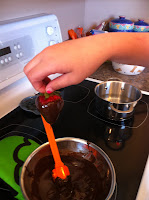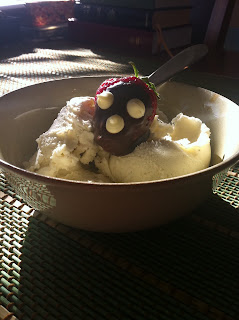Well, I certainly hope so. That is, I'm working on it.
Overall, I love the public school my kids attend. There are various issues, some being school-wide, and others being city-wide (and thus harder to take on--not that I'm not trying!), as there are in any school, but so far we've been very fortunate and my two older children have had largely positive experiences.
As a family, we do some things differently than many of the families in our neighborhood. As a member of the "natural parenting" community, I see a great deal of blog posts and articles all about homeschooling and its benefits. I know them well, as I homeschooled my son before he attended Pre-K. My husband and I both value public school education, and we like the fact that our children have other authority and mentoring figures in their lives--we think of it as part of the "it takes a village" mentality.
Since I don't currently homeschool, I've often wished that I could find resources on how to continue to parent the way we do while our kids are in an environment that is, at times, very different, if not completely opposite from the one at home. After three years of parenting children receiving public school education under my belt, I've made some discoveries on what works for us and I'd love to share them with you.
First and foremost, know your child. I have two typical, active, social children, and neither of them require any special services. They are adaptable and adjust quickly to change, and they are not intimidated by the size of the school, nor the number of students (1400! Though I have to say it doesn't really feel that way). Our school is a good fit for them. Children's needs vary. Some may flourish with a busy, active pace, while some may need a smaller, quieter environment. Don't automatically rule out a large school, but don't assume your child will adjust, either. If you are a free range parent, be aware that children in typical public school are expected to line up, sit down, stand up, and the like, pretty much by the end of Kindergarten (it's really not that bad. But again, it's all about your child, and your personal beliefs about learning and teaching).
Make friends. With your child's teacher, that is. We all hear teacher horror stories, but in my experience, the vast majority of educators are wonderful people who care about children and like (if not love) their job. One of the best things I've done for my kids has been to get to know their teachers. I keep up correspondence in whatever way is appropriate and accepted, and keep the lines of communication open. Since I sometimes have requests or questions that most other parents do not, being friendly is a must. If a teacher goes above and beyond to work with my child, I make sure he/she knows I appreciate the extra attention. And if my children are involved in a discipline issue, I make sure I am receptive and not defensive. Nothing turns a teacher off more than a defensive parent who seems unwilling to listen to constructive feedback.
Get involved. Admittedly, this can be difficult, if not impossible, if both parents work. I have to say, though, there is no better way to find out what's happening in your child's school, and in their classroom, than investing some time there, no matter how minimal it is. Parent teacher conferences are a great way to start, as are curriculum days and any open classroom days that your school might have.
I am on our school's PTA and it is absolutely invaluable for me and my children. I am in the building several times a week and have gotten to know the administration, as well. This gives me the opportunity to bring to light issues that I would like the school to work on, and allows me to even tackle some of them along with a wonderful group of parents who are also devoted members of the PTA. It's a sincere privilege. If joining the PTA or volunteering time seems impossible, start an email list with other parents in your child's class, and keep communication going that way. Other parents are a great resource. I have gotten much useful information just chatting at pick-up.
Unless the school has a food co-op or a kitchen that makes fresh meals, make your kids' lunch. The NYC Department of Education tries, goodness knows--but the meals are still not things I would feed my children on a regular basis. For one, they are not prepared on site, and they are mass-produced. There is a huge healthy eating initiative going on right now, and though I appreciate the effort, that food cannot possibly compare to what I make at home. With all the focus we put on healthy, organic food, it would be impossible to accept school lunch for my children.
Don't let school supply lists or teacher requests intimidate you. When my son was in Kindergarten, it was requested that we send his snack and lunch in brown paper bags and ziplock bags. I sent a note kindly explaining that as we were trying to reduce waste in our household, all of the containers and bags we sent our son to school with were reusable, and were not to be thrown away (and this will certainly be the case for my daughters, as well). LunchBots, KidsKonserve and LunchSkins are all companies that sell reusable lunch supplies.
Each year's school supply list requests Purell sanitizer, a conventional cleaning spray, and Huggies baby wipes, and I stubbornly send in BabyGanics hand sanitizer and Seventh Generation cleaner and wipes. I'm thisclose to sending in a homemade cleaner, next!
Choose your battles wisely, and fight fervently. There are certain things, like slowing the curriculum pace or shortening the school day, that are pipe dreams, and I've learned that it's best to focus on things that are feasible for the school to change or improve, like amount of physical activity the children receive, activities and fundraisers to promote spirit and unity, and various other concerns where a solution seems attainable. This isn't to say that the big fights shouldn't be fought, though. Just this past year our school won a huge battle with the Department of Education, and it was one of our community's finest moments.
Don't let your child become another brick in the wall. Our school makes a great effort to make its students feel attended to and looked after. I've never been made to feel like my child is just one among the crowd. At the same time, there is a certain amount of group activity inside the classroom and out, and there are certain expectations that are placed on the children in terms of following directions and receiving instruction (if only for safety and the sheer mass of children going anywhere at a given time. Lunch periods boast over 400 kids in one space). As long as the children are treated respectfully and are given positive reinforcement, I don't take issue with that. Here is something I'm attempting to tackle: the lunch aides in particular leave a lot to be desired in terms of how they approach the children. My goal is to meet with the principal and talk about giving the aides further tools to positively discipline the kids without incessant yelling or unreasonable punishment.
Stay strong--you and your children both. We are living in an age where seemingly every person in civilized society has a gadget and/or is on some type of social networking site. I share a fair amount online and I have a love/hate relationship with social networking, and I don't think it's appropriate for my children. My eight year old son asked me what Facebook was the other day. As I explained it to him I made sure he understood that in our family, at least, that kind of activity is reserved for adults. He also asked me when he would be able to get an iPhone (my answer was, when he's old enough to work and pay for it himself. Same for my girls. That's just the way the cookie crumbles). It's worth noting that many people we are close to and care about make different choices for their kids when it comes to this, so it's important that I reserve criticism and not come from a place of judgment, rather point out that these are our family's choices and what we believe is acceptable.
Along the same lines, my kids will ask for certain food, toys or activities that they see other children getting or engaging in. Once again, I do my best to reserve criticism--even more so since we talk a lot about people being created different, but equal. I have to accept that as many positive things as my kids are being exposed to, there is plenty of negative exposure, as well. and I simply explain our family's beliefs and reiterate why we choose to live the way we do and consume what we do. It gets harder as our children get older, especially as they approach the age where insecurity sets in, and they just want to be liked. Going against the grain gets tougher and tougher. To that end, I try and instill in my kids a strong sense of self. I want them to be independent, confident and steadfast in who they are--and of course, that starts with me.
Come September, I will have two kids in school all day, with only my little one left at home to brainwash—er, parent and teach. My hope is that all my children will take with them the good lessons and learn to ignore the bad.
















